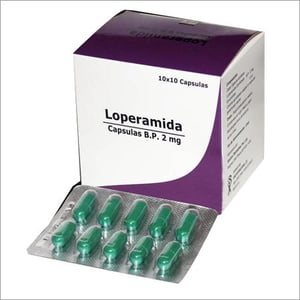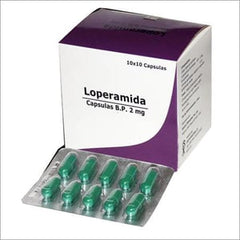Chat with us online
New to ZimSeller? Get 10% Off with Code: WELCOME
Currency


Description
x|
For adults with acute diarrhoea: take two tablets/capsules as soon as possible; then take one tablet/capsule after each time you go to the toilet with diarrhoea. Have lots of water to drink to prevent you from becoming dehydrated. Eat as normally as possible, as soon as you feel able. If your symptoms continue for more than 48 hours, speak with your doctor or pharmacist for advice if you have not already done so. Loperamide must not be taken by children under 12 years of age unless it is prescribed for them by a doctor. |
What is loperamide?
| Type of medicine | An antimotility medicine |
| Used for | Acute diarrhoea |
| Also called | Diah-Limit®; Dioraleze®; Entrocalm®; Imodium®; Norimode® |
| Available as | Capsules, tablets, 'instant' (dissolve-in-the-mouth) tablets, and oral liquid medicine |
Loperamide is a medicine that can help if you have acute diarrhoea. Acute diarrhoea in adults starts suddenly and in most cases eases within a few days. The main treatment is to have lots to drink to prevent dehydration. The most common cause of acute diarrhoea is an infection. Many bacteria, viruses, and other germs can cause diarrhoea. In most cases the diarrhoea settles as your body's immune system clears the infection. Antidiarrhoeal medicines like loperamide may not be necessary; however, they can be helpful if you wish to reduce the number of trips that you need to make to the toilet. Most people only need to take loperamide for a day or so.
Loperamide works by slowing down the activity of your bowel. This reduces the speed at which the contents pass through, and so food remains in your intestines for longer. This allows more water to be absorbed back into your body and results in firmer stools that are passed less often.
Because loperamide regulates the passage of food through the digestive system, it can also help people with diarrhoea associated with irritable bowel syndrome, and people who need help to regulate their bowel movement following surgery on the intestines.
You can buy loperamide from retail outlets or get it on prescription from your doctor; however, it is not suitable for children under the age of 12 years unless it has been prescribed by a doctor.
Before taking loperamide
To make sure this is the right treatment for you, before you start taking loperamide it is important that you speak with your doctor or pharmacist:
- If you are pregnant or breastfeeding.
- If you have liver problems.
- If you have a long-term bowel condition such as ulcerative colitis.
- If you are taking any other medicines. This includes any medicines you are taking which are available to buy without a prescription, as well as herbal and complementary medicines.
- If you have ever had an allergic reaction to a medicine.
How to take loperamide
- Before you start the treatment, read the manufacturer's printed information leaflet from inside the pack. It will give you more information about loperamide and will provide you with a full list of the side-effects which you may experience from taking it.
- Take loperamide exactly as your doctor tells you to, or as directed on the label. The usual dose for acute diarrhoea in an adult is 4 mg (two tablets/capsules) taken straightaway, followed by 2 mg (one tablet/capsule) after each time you go to the toilet with diarrhoea. This usually means taking three or four tablets/capsules a day. Never take more than eight tablets/capsules a day. If your symptoms continue for more than 48 hours, you should speak with a doctor if you have not already done so. Stop taking loperamide as soon as your symptoms settle down.
- Most loperamide capsules and tablets are best swallowed with a drink of water. However, if you have been given a brand called Imodium® Instants, these are specially designed to dissolve in your mouth - place the tablet on your tongue and allow it to dissolve there before you swallow.
- Loperamide should only be taken by a child younger than 12 years of age on the advice of a doctor. If your child has been prescribed loperamide liquid medicine, check the label on the bottle carefully to make sure you know what dose to give.
- If you forget to take a dose, do not worry, just take a dose after the next time you go to the toilet with diarrhoea. Do not take two doses together to make up for a missed dose.
Getting the most from your treatment
- It is important that you have lots to drink to prevent you from becoming dehydrated. Drinking plain water is ideal, but juice and/or soup are also suitable. Try to avoid drinks that contain a lot of sugar, such as cola or pop, as they can sometimes make diarrhoea worse.
- Oral rehydration salts can be taken to help prevent dehydration and replace lost salts. These are especially recommended for children and for people who are frail or who have underlying health problems. You can buy these from a pharmacy.
- Eat small, light meals as soon as you are able. Plain foods such as bread and rice are good foods to try eating first.
- If your symptoms continue for more than 48 hours, speak with a doctor or pharmacist for advice if you have not already done so. If loperamide has been prescribed by your doctor and your diarrhoea has not settled after five days, you should return to your doctor for further advice.
- If your symptoms get worse, or if you develop a high temperature, or if you pass blood in the diarrhoea, you should consult a doctor for advice as soon as possible.
Can loperamide cause problems?
Along with their useful effects, most medicines can cause unwanted side-effects although not everyone experiences them. The table below contains some of the most common ones associated with loperamide. You will find a full list in the manufacturer's information leaflet supplied with your medicine. The unwanted effects often improve as your body adjusts to the new medicine, but speak with your doctor or pharmacist if any of the following continue or become troublesome.
| Common loperamide side-effects (these affect fewer than 1 in 10 people) | What can I do if I experience this? |
| Constipation | Stop taking loperamide |
| Wind (flatulence), feeling dizzy | This should soon pass. If it becomes troublesome, stop taking loperamide |
| Headache | Drink plenty of water and ask your pharmacist to recommend a suitable painkiller. |
| Feeling sick (nausea) | Try taking loperamide after eating some food if you are not already doing so |
If you experience any other symptoms which you think may be due to loperamide, speak with your doctor or pharmacist for further advice.
How to store loperamide
- Keep all medicines out of the sight and reach of children.
- Store in a cool, dry place, away from direct heat and light.
Additional Information
xThis product is shipped directly from South Africa. Please note that you may be charged customs duties and taxes for products purchased from ZimSeller for the following reasons.
- Exclusive Product Price:
- The price of goods you purchase from ZimSeller does not include customs duties or taxes. These charges are also not part of the shipping costs you pay at checkout on our website.
- Shipping Origin:
- All products sold by ZimSeller are shipped from South Africa. As these goods do not originate in your country, they may be subject to customs duties, which are tariffs or taxes imposed on goods transported across international borders.
- Customs Union Zone:
- When products are not shipped domestically or within a customs union (e.g., the European Union), you are responsible for paying any inbound duties and taxes deemed appropriate by your local customs authority.
- Prepaid Duties:
- To ensure timely delivery of your goods after they arrive in your country or customs union, couriers often pay customs duties and taxes on your behalf. The goods are delivered to you once these charges are repaid to the courier.
- Calculation Method:
- The amount of duty payable, if any, is determined by your local customs authority. It depends on factors such as the type of goods, their transactional value, and the package weight.
What we recommend
Before making a purchase on ZimSeller, always check with your local customs authority to confirm:
- Whether the products are legal to import into your country.
- If duties will be charged on the goods, and if so, how much.
- Whether the products can be imported from outside your customs union zone.
Payment Options
xPayment Options
We provide a range of secure and convenient payment methods to accommodate your preferences.
Card Payments Online
Pay effortlessly using major credit and debit cards, including Visa and MasterCard, through our secure online gateway.
Manual Payment Options
Bank Transfer: Transfer funds directly into our South African bank account (Standard Bank or FNB). Contact us to obtain our bank details.
Western Union: Make payments from anywhere in the world via Western Union. Reach out to us for recipient details.
MoneyGram: Send payments globally via MoneyGram. Contact us for the necessary recipient information.
Select the payment method that suits you best and shop confidently with ZimSeller Pharmacy!
Important Note
We regret to inform you that PayPal payments are no longer accepted, as PayPal has ceased working with online pharmacies.
Health Disclaimer
x| Our Intention | The information provided on ZimSeller is intended for general informational purposes only. It should not be considered a substitute for professional medical advice, diagnosis, or treatment. |
| Consult Healthcare Professionals | Always consult a qualified healthcare professional before using any product, especially if you are pregnant, nursing, taking medication, or have a pre-existing medical condition. A professional evaluation ensures the product is suitable for your individual needs. |
| Product Purpose | The products sold on ZimSeller are not intended to diagnose, treat, cure, or prevent any disease. They are provided as over-the-counter options to support general health and wellness. |
| Individual Results | Individual results may vary based on factors such as age, health status, and how the product is used. Effectiveness cannot be guaranteed for everyone. |
| Usage Guidelines | It is important to carefully read all product labels, warnings, and directions before use. Adhering to the provided guidelines ensures safe and effective use of the product. |
| Adverse Reactions | In the event of an adverse reaction, discontinue use immediately and consult a healthcare provider. Your safety is our priority, and we encourage reporting any concerns for further assistance. Would you like additional customization or branding elements added to these headings? |
- Choosing a selection results in a full page refresh.






